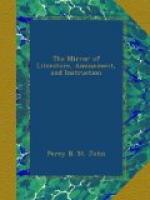They quitted the place together; and many a sympathizing heart did they leave behind them—by many an anxious wish and prayer were they followed. The last promise required from me was, that I would see that the grave of her brother was respected. What a pang did it cost her to leave that grave?
I heard tidings of her three times afterwards. Her letters pleased me; they testified a deep, but not a selfish or corroding grief—a power of exertion, and a disposition to hope and be cheerful. The last letter I received from her, arrived more than five years ago. She had taken the name which I conjectured would in time be her’s. She had lost her grandfather; but the time was past when his departure could occasion much grief. She was then going abroad with her husband, for an indefinite period of time. If they were spared to return to their native country, they proposed visiting my little dwelling once more, to gaze with softened emotions on scenes sadly endeared to them, and to mingle their tears once more over a brother’s grave.
Perhaps that day may yet arrive.
Literary Magnet.
* * * * *
ARCANA OF SCIENCE.
* * * * *
Polar Expedition.
It is known by the experience of all former voyages to the arctic circle, that towards the end of the season, in consequence of the heat radiating from the lard, the ice is detached from the shores of these seas, and floats southward. Ice, therefore, does not detach from other ice, but from the coast. Taking this principle with us, when we find that our expedition traversed a surface of some hundred miles, we conclude, whatever was the extent of that mass drifting south, it must have left an equal extent of open water in its original place in the north. We also infer, that there must be land at the north pole, from which this body was separated; and that if it could have been entirely crossed, Captain Parry and his companions would have found a clear sea for the boats, and had little difficulty in reaching Polar Land.—Literary Gazette.
Pemecan.
This substance (mentioned in our recent abstract of the Polar Expedition as part of the provision for the crew) consists of meat prepared in the same way that the Indians prepare their provision of buffalo or deer. The flesh, beef in this case, is cut into stripes, and dried by the smoke of wood. It is then beaten into a powder, and an equal proportion of fat being melted, the whole is mixed up together into a solid mass. It is evident that more of real sustenance from animal matter cannot be combined in any less bulky or burdensome compound. It makes an excellent and very nutritious soup.
Egyptian Architecture.




